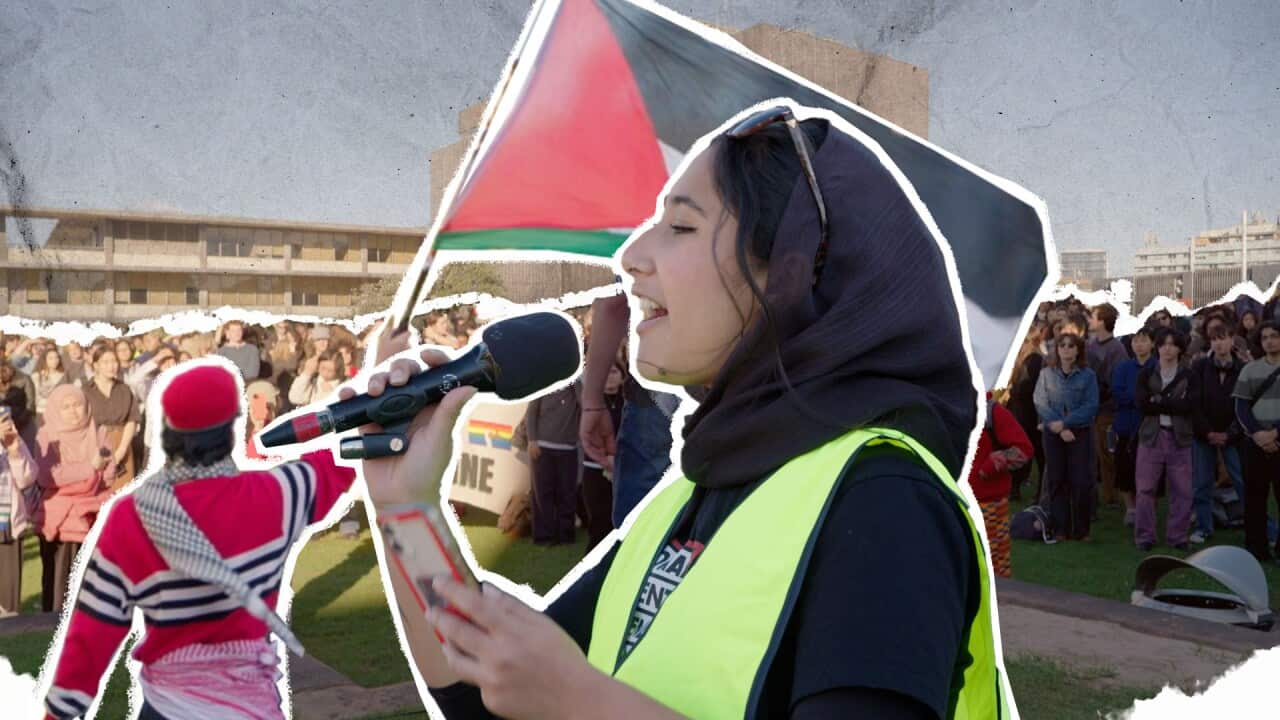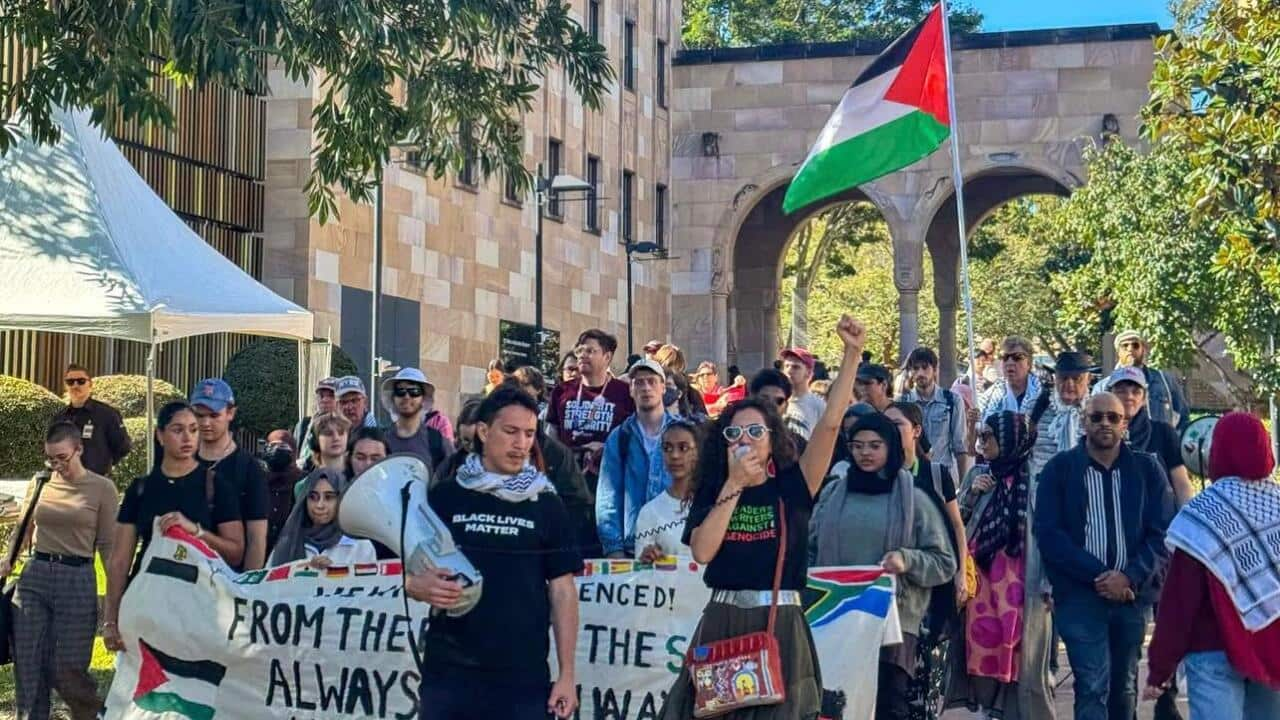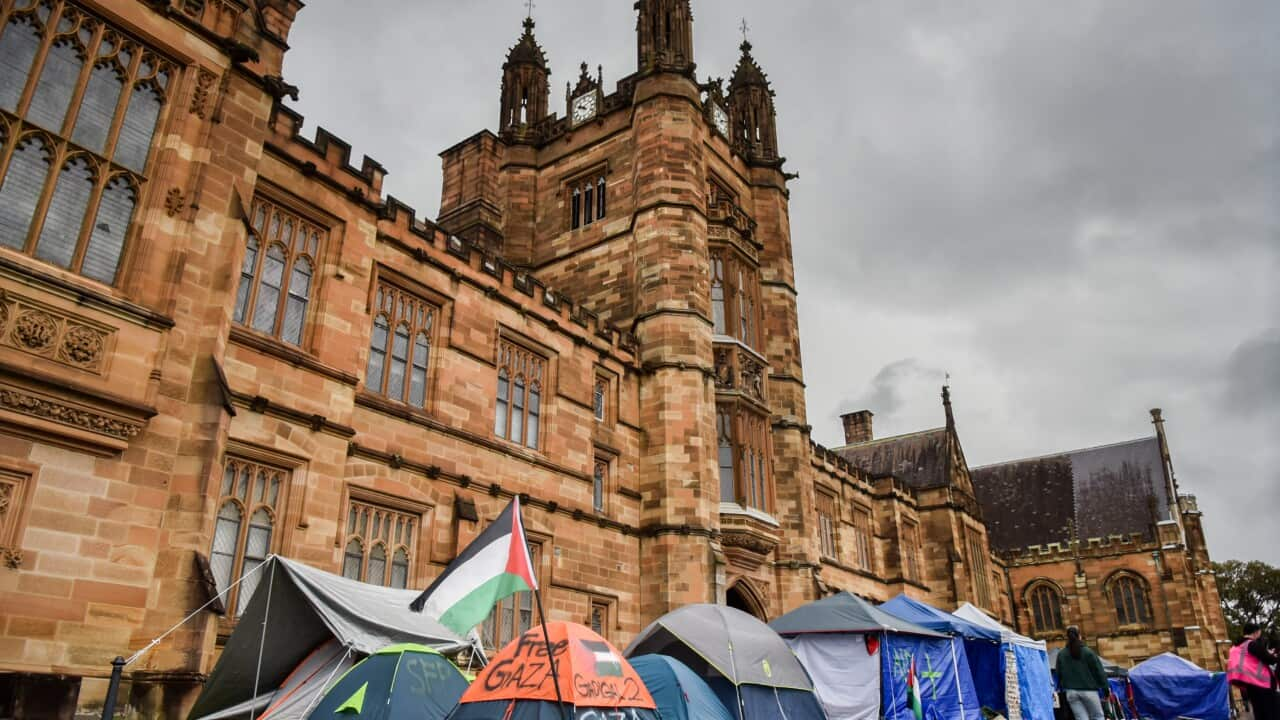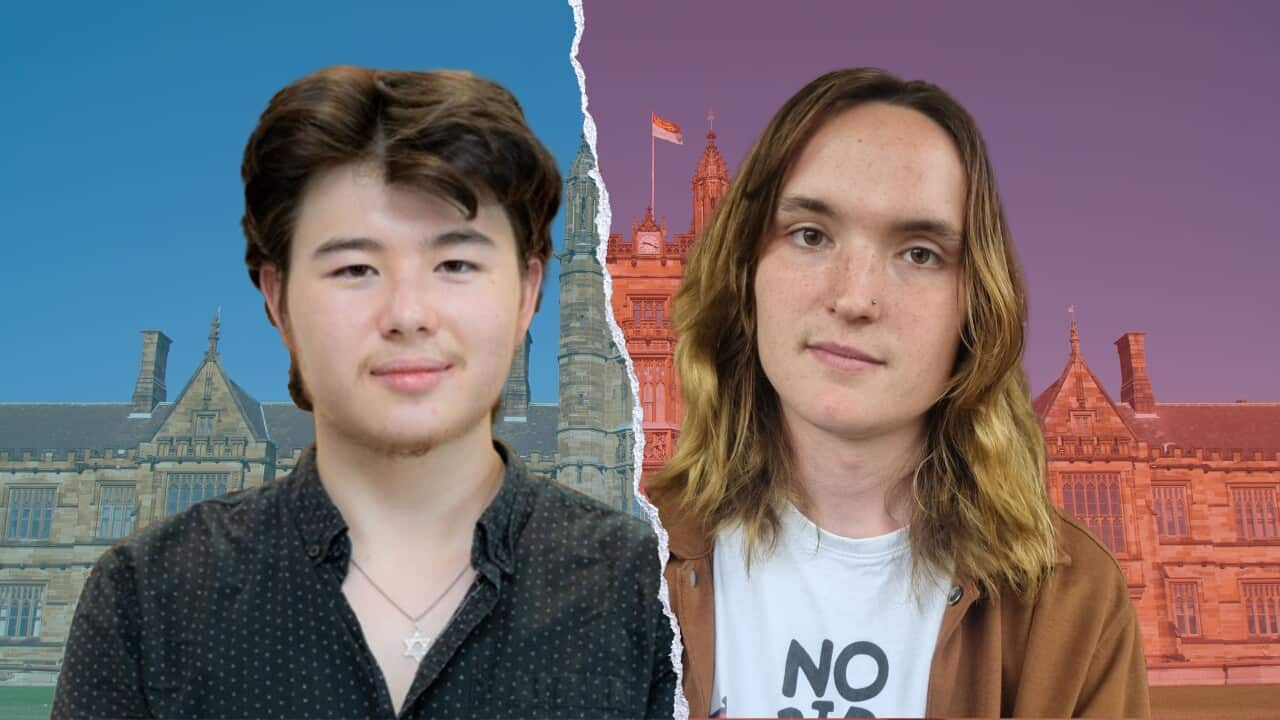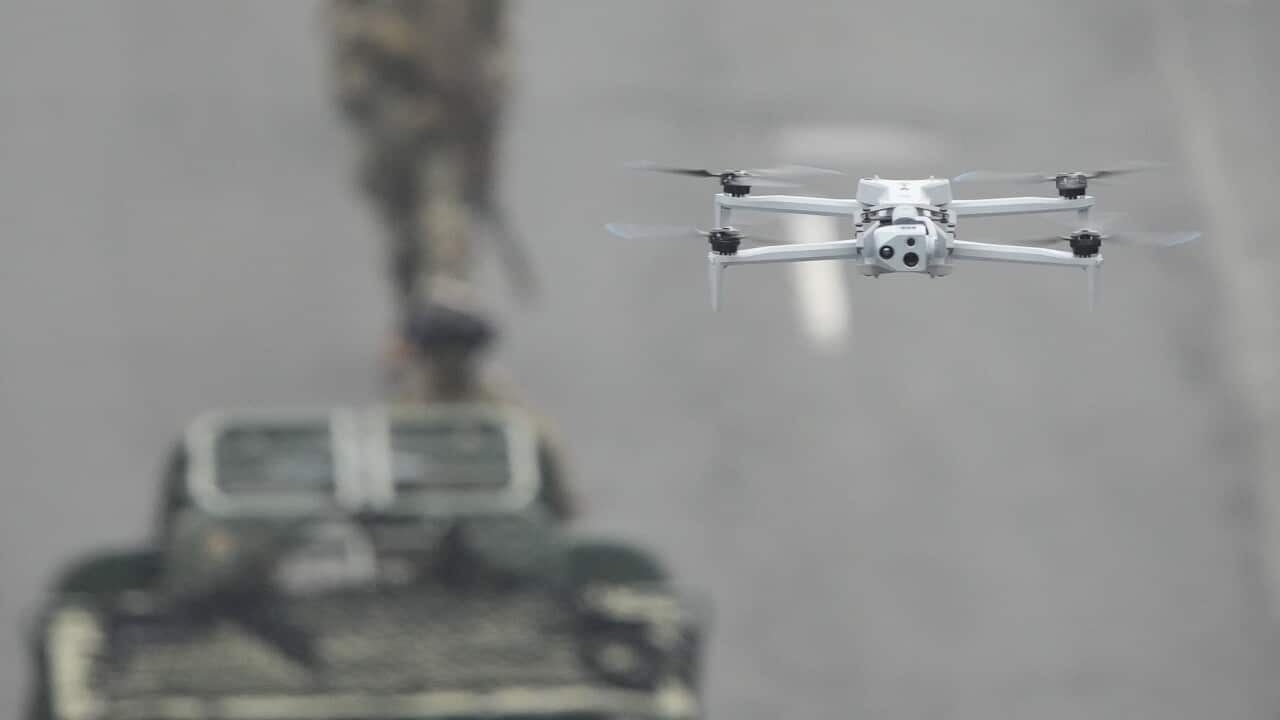The lawns that surround the University of Sydney's Main Quadrangle have often transformed into an arena for the student voice.
Under a shadow cast by the Great Hall — built in Victorian Gothic style and reminiscent of England's Oxford and Cambridge universities — student Jasmine Al-Rawi stood before a mass meeting and declared: "We have the power to defeat the imperialist blood-soaked monsters that run our world."
Building on a long legacy of Australian university campus movements, including against apartheid in South Africa and Australia's involvement in the Vietnam War, this generation of students are rallying for Gaza.
Their latest action took the form of a decisive vote.
In late August, the National Union of Students (NUS) and the Students for Palestine collective put two motions to Australia's more than 1.6 million university students — the first national student referendum in 50 years.
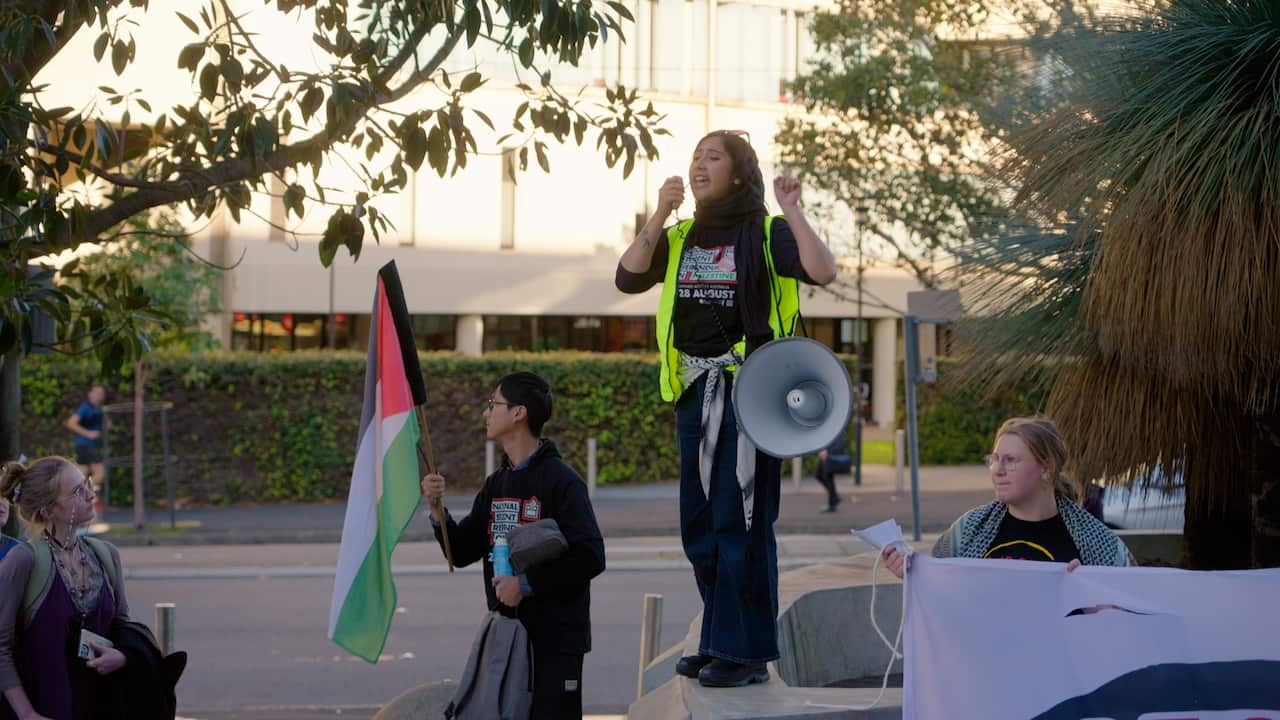
Student Jasmine Al-Rawi is part of the Students for Palestine collective, a group that has regularly staged protest action against Israel's offensive in Gaza since 7 October 2023. Source: SBS
A report by the United Nations (UN) Independent International Commission of Inquiry, which does not speak on behalf of the world body, recently found "Israeli authorities and Israeli security forces have committed and are continuing to commit ... genocide" against the Palestinians in the Gaza — an accusation Israel has said it "categorically rejects".
"Our responsibility is to pile the pressure on our government and our universities and call out their complicity," James McVicar, NUS education officer and vote organiser, told The Feed.
"In the context where the Australian government is obviously coming under more and more pressure every day for their continued support of Israel ... they're the things we thought that students could actually have an impact on."
Australia recognised the State of Palestine in September, although government figures did not say the policy shift was a response to domestic political pressure.
The referendum received 5,295 registered votes — less than 1 per cent of the national student body — and showed overwhelming support for the motions, with a unanimous result on some campuses and a strong majority on others.
The few students who voted against the motions say unions shouldn't host debates that risk fracturing the student body.
"Universities should be spaces of learning, respectful debate and coexistence," said one opponent of the motions at the University of Technology Sydney.
More than 4,000 students voted in person across 20 campuses, with the rest participating via an online portal. While students regularly hold decentralised votes, this national ballot stands as a rare example of collectivism at a time when student unionism is otherwise in general decline.
But the last student referendums, five decades ago, didn't play out in the same way.
A 'major ideological question'
It's 1973.
United States combat units have withdrawn from Vietnam following the signing of the Paris Peace Accords — the superpower's first defeat in a foreign war.
Israel's occupation of Palestinian territories is emerging as the next key struggle in the minds of the far left — who are gradually gaining support among university student unions but not more widely.
Mick Armstrong was, at that time, an economics student at Melbourne's La Trobe University.
"It was very polarised," he told The Feed.
"[The Occupied Palestinian Territories] became a major ideological question on the left, but it didn't really have the same mass support amongst students."
In 1974, a range of positions on Palestinian recognition, governance and rights are being debated at mass campus meetings across the country.
Seven pro-Palestinian motions are put forward by the leadership of the Australian Union of Students, the predecessor to the NUS.
Some affirm recognition of Yasser Arafat's Palestinian Liberation Organisation — a group formed in 1964 to centralise the leadership of various clandestine resistance movements — and its military wing.
Joe Gersh, president of the Australian Union of Jewish Students (AUJS) at the time, condemns the motions for their "traumatic effect on Jewish students".
All are defeated by around 90 per cent on most campuses, bar a general student meeting at Flinders University that defies the trend.
A year later, in 1975, differently worded motions attract a marginal increase in support but are heavily defeated too.
"Nothing is more wasteful of our meagre resources, nothing more deleterious to the remaining activities for the year, than another extensive Middle-East debate on campus," Gersh writes on behalf of the AUJS executive in July 1975, in a report on the "rise of anti-Israel sentiment" among university students.
While the activist group that student Mick Armstrong was involved in at the time anticipated the motions would fail, they "thought it was an important debate to have and ... was definitely worth doing once".
"People thought this was going to be the new radical cause … the new Vietnam," he said.
The Australian Union of Students was officially dissolved in late 1984, in part due to a loss of campus affiliation following the student referendums and factional infighting. The outgoing president was future prime minister Julia Gillard.
Australia under pressure over F-35 links
Fifty years on, the student movement for Palestinian rights is spotlighting the issue of the arms trade with Israel.
Since 7 October 2023, the Australian government has faced increasing pressure for greater transparency of its military exports, particularly in relation to the F-35 stealth strike fighter jet program.
Australia is among a group of F-35 partner countries contributing parts and components to a global supply chain that includes Israel as a customer.
Chris Sidoti, an Australian human rights expert who was part of the UN Independent International Commission of Inquiry, singled out Australia's involvement during a National Press Club address this month.
"If components that are being manufactured here in Australia are finding their way into F-35 aircraft being used by Israel to bomb the hell out of Gaza, we share responsibility," he said.
Foreign Minister Penny Wong has insisted Australia only provides "non-lethal" parts for F-35s and has placed responsibility for any transfers to Israel on US arms companies.
Australia currently has 54 defence export permits for Israel, defence officials revealed at Senate estimates earlier this month.
Deputy secretary of strategy, Hugh Jeffrey, said 22 permits with Israel have been granted since 7 October 2023, of which five have expired, but clarified: "having a permit … does not equate to the export of a weapon".
Independent media outlet Declassified Australia has reported that leaked documents show at least 68 shipments of F-35 parts were sent directly from Australia to Israel between October 2023 and September 2025.
The Feed contacted the Australian Department of Defence for clarification on its role in the F-35 supply. It did not directly address those questions.
In a statement released in April 2025, the department welcomed the Australian industry contribution to the global F-35 program reaching more than $5 billion in contract value.
"This significant achievement in the global F-35 Program highlights the strength and innovation of our defence industry and the important role it plays in supporting Australia's Defence strategic interests," it said.
"More than 75 Australian companies have contributed to this success through advanced manufacturing, supply chain solutions and sustainment services."
In a statement, Lockheed Martin, the main F-35 contractor, said: "Details regarding the shipment of F-35 components are best addressed by the US government."
Military exports and Australian universities
Australian universities' links to major defence contractors — and their alleged involvement in the global arms trade — is behind the referendum's second motion and spurred months-long student encampments earlier this year.
"We know that the university has millions of dollars in investment ties with weapons companies which supply arms to the state of Israel," Shovan Bhattarai, co-convener of the University of Sydney Students for Palestine collective, told The Feed.
"And more horrifically, we also know that our university continues to get students here to do study for those weapons companies.
"We think that is a crime."
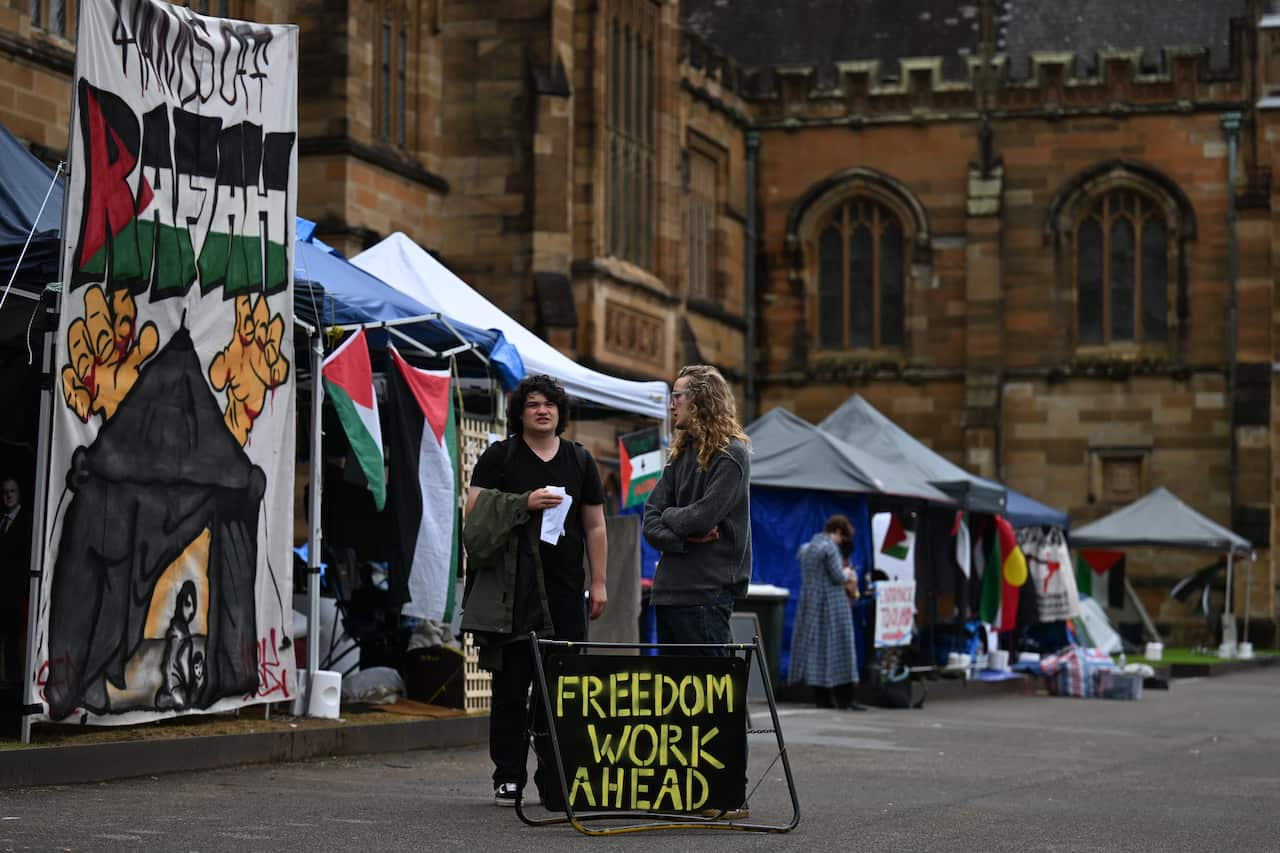
The University of Sydney's protest encampment began on 24 April 2024, and lasted 55 days. Source: AAP / Dean Lewins
Since Israel's assault on Gaza began, that partnership has drawn the ire of hundreds of students who vehemently oppose their fees being used to support research connected to weapons manufacturers.
The renewal built on a Memorandum of Understanding signed in 2017, "that would see the University of Sydney's researchers offered new opportunities to collaborate on transformational industry projects and Thales to obtain access to world-class research," according to then-vice-chancellor and principal, Michael Spence.
It continues today in the form of "research and student placements in engineering and robotics," a University of Sydney spokesperson told The Feed.
But some students say the partnership deepens the university's ties to a company that — beyond academic collaboration — plays a key role in the global supply chain of weapons.
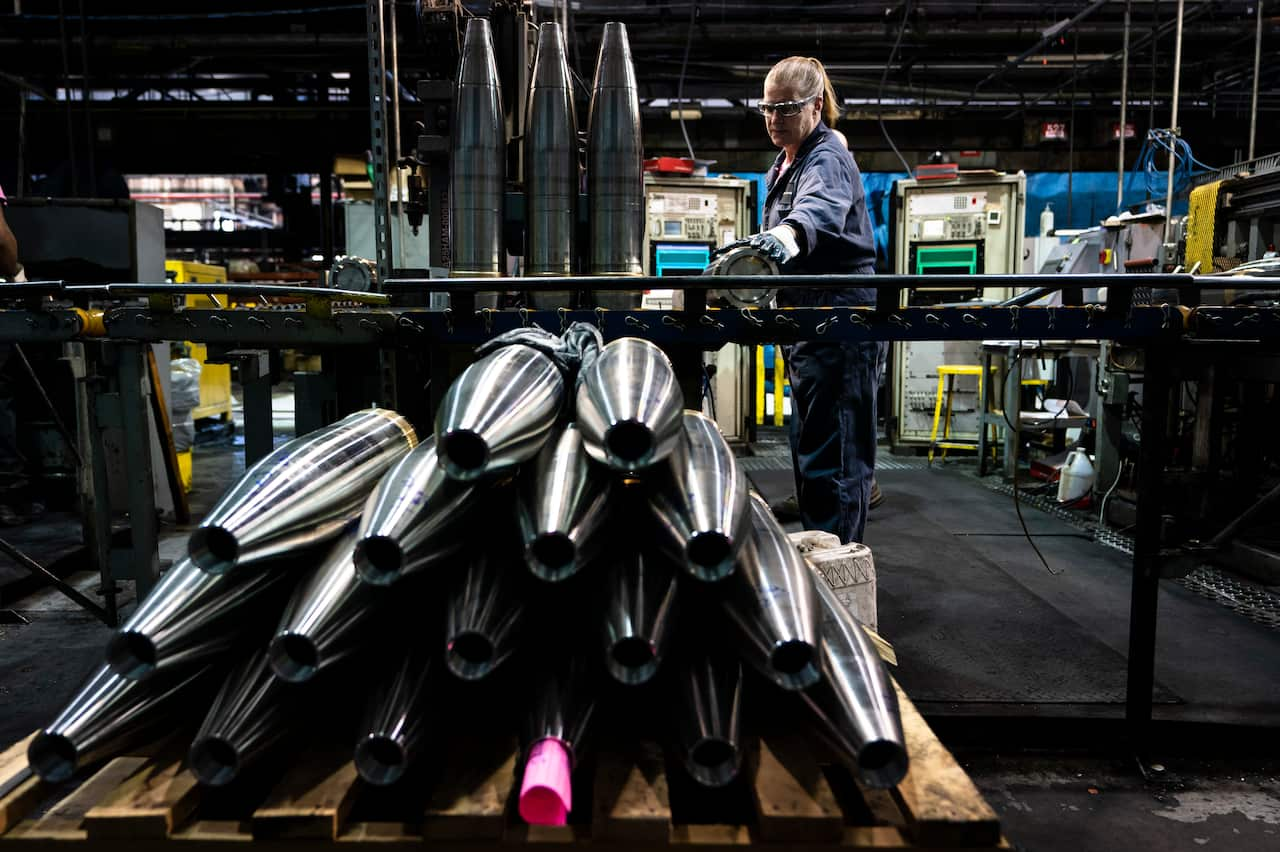
Australia is building the first dedicated forge outside the US to produce 155mm M795 artillery ammunition for the M777A2 Light Towed Howitzer. Source: AAP / Matt Rourke
In October 2024, the Australian government selected Thales as its preferred tenderer to build a "domestic forging capability" for highly explosive 155mm M795 artillery ammunition — in Victoria's regional town of Benalla. The project had been earmarked nearly three years earlier.
While the agreement was walked back by the defence department in June this year — citing the need to "refine" requirements before "reapproaching the market" — it said it remains "committed to working with industry to deliver a 155mm M795 forging capability by 2028".
Amnesty Australia has repeatedly voiced concern that Australian-manufactured munitions could — through legitimate export permits between Australia and the US — be used by Israel against Palestinians in the occupied territories.
In December 2023, an export permit for $147.5 million worth of 155mm projectiles was approved by the US to be sent to Israel, according to the Defense Security Cooperation Agency, an agency of the US defence department.
A spokesperson for the University of Sydney said: "Collaboration with Thales Australia, an Australian Defence Force partner, focuses on research and student placements in engineering and robotics, two local industries that underpin our national safety and prosperity."
Thales Australia did not respond to a request for comment before publication.
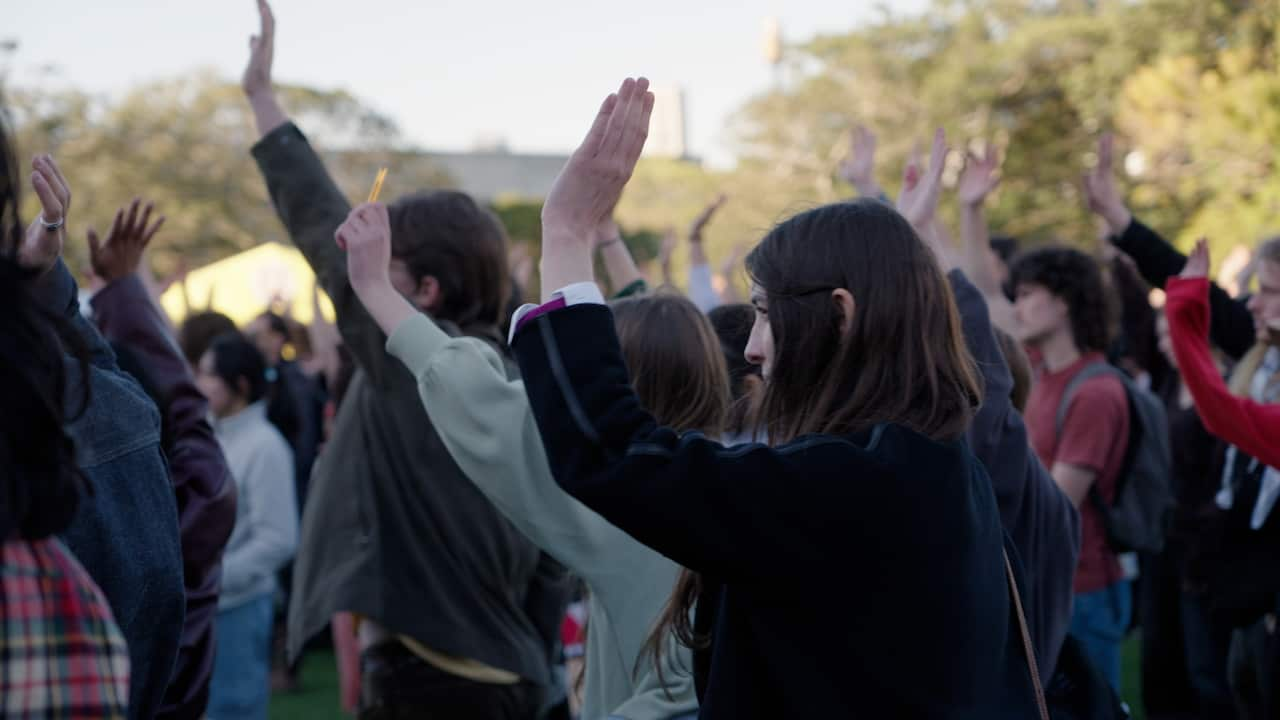
An overwhelming majority of student participants voted for a motion which called on Australian universities to "end their complicity with Israel's genocide by ceasing all partnerships with weapons companies". Source: SBS
For instance, the federally funded Centre for Excellence for Engineered Quantum Systems (EQUS) was a long-running collaboration between multiple Australian universities and third-party companies, including Lockheed Martin.
According to the Australian Research Council, EQUS received over $30 million in government funding between January 2018 and May 2025, which is listed as the project's anticipated end date.
"While the Centre may be finished, the work, connections, and impact continue," the official account posted to LinkedIn last week.
Universities listed as participants include Macquarie University, the University of Queensland, the University of Sydney, the University of Western Australia and the Australian National University.
Students demand accountability
Student activists at Macquarie University believe the university has perhaps the "closest ties" of any university to the F-35 supply chain — involvement the university has denied altogether.
"Lockheed Martin is not a current partner — major or otherwise — of the University," a spokesperson for Macquarie University said.
A now-deleted EQUS webpage said as recently as February 2025 that Macquarie University researchers had "worked in collaboration with Lockheed Martin US on designing quantum enabled levitated sensors," which can be used in military aircraft.
While Macquarie University acknowledges it "previously collaborated with Lockheed Martin on four projects," it said, "at no point did these projects include weapons research and development, and all have now concluded".
"None of these projects are linked to the F-35 supply chain.
"The utmost care is taken to ensure that any research we conduct is in the interest of national security and is defensive, not offensive, in nature."
Thales and Lockheed Martin are both major partners of the Australian Defence Force.
Student-led campaigns have influenced divestment outcomes in the past.
In October 2023, RMIT University broke a research deal with Elbit Systems — Israel's largest privately-owned weapons developer, which produces around 85 per cent of Israeli drones and land equipment — after a year of protest action taken by thousands of students and staff.
"RMIT does not have a partnership with Elbit Systems or any of their subsidiaries, including Elbit Systems of Australia (ELSA)," it said in a publicly issued statement, while acknowledging the "humanitarian impacts" of the "Israel-Gaza conflict".
Award-winning journalist and author Antony Loewenstein, who has long investigated Israeli weapons and surveillance technologies, condemned the RMIT-Elbit partnership earlier that year, saying: "If you partner, as a state or a university, with a company like Elbit, you have blood on your hands because the record of Elbit in Israel-Palestine ... is so damned clear".
'We're just doing research'
But how much of an influence do Australian universities really have when it comes to large-scale global conflicts?
UNSW military ethicist Neil Renic said when dealing with the notoriously murky global arms trade, it can be a challenging question to answer.
"If you're having Australian universities and other research institutions make a significant contribution to weaponry or military thinking … in some instances, it's going to end up in a war that's riven with war crimes," he told The Feed.
"But it's difficult when you break it down to the level of the individual or even at the level of one research institution — the contribution can seem marginal or even ethically good in some instances."
Renic said there's a tendency for universities to avoid publicly grappling with the ethical dilemmas around such collaborations.
"It becomes very easy to say things like: 'We're just doing science, we're just doing research'. And there could be a difficulty, often coupled with a lack of curiosity, as to where your work is kind of eventually ending up."
There's a growing set of dual-use technologies, including AI, robotics and drones, that are eventually used on the battlefield, he added.
"There's a lot of technologies that can have a civilian purpose but also have a military purpose, which I think it adds to the challenge to work out: 'Am I involved in something that's morally problematic?'"
Head of peak tertiary body Universities Australia, Luke Sheehy, defended university partnerships across sectors like defence as "vital" to Australia's national security.
"Australian universities undertake research and industry partnerships that serve the national interest, strengthen our sovereign capability and create opportunities for students and communities," he said.
"Universities determine their own research and partnership priorities in line with their governance processes, ethical frameworks and relevant government legislation and processes, ensuring decisions are made responsibly and in line with the values of the communities our universities serve."
'Righting a historical wrong'
The leadership of the current national student union acknowledge their referendum — and its result — has come at a very different time than the last, 50 years ago.
"[The] situation has just changed so drastically today that the horrors in Gaza have really laid bare the reality of the whole project of the occupation of Palestine," McVicar, NUS' Education Officer, said.
"I think the history of Australian student unionism ... it feels like we are righting a historical wrong in Australia by correcting the record with the history of the failed student referendums on Palestine in the past."
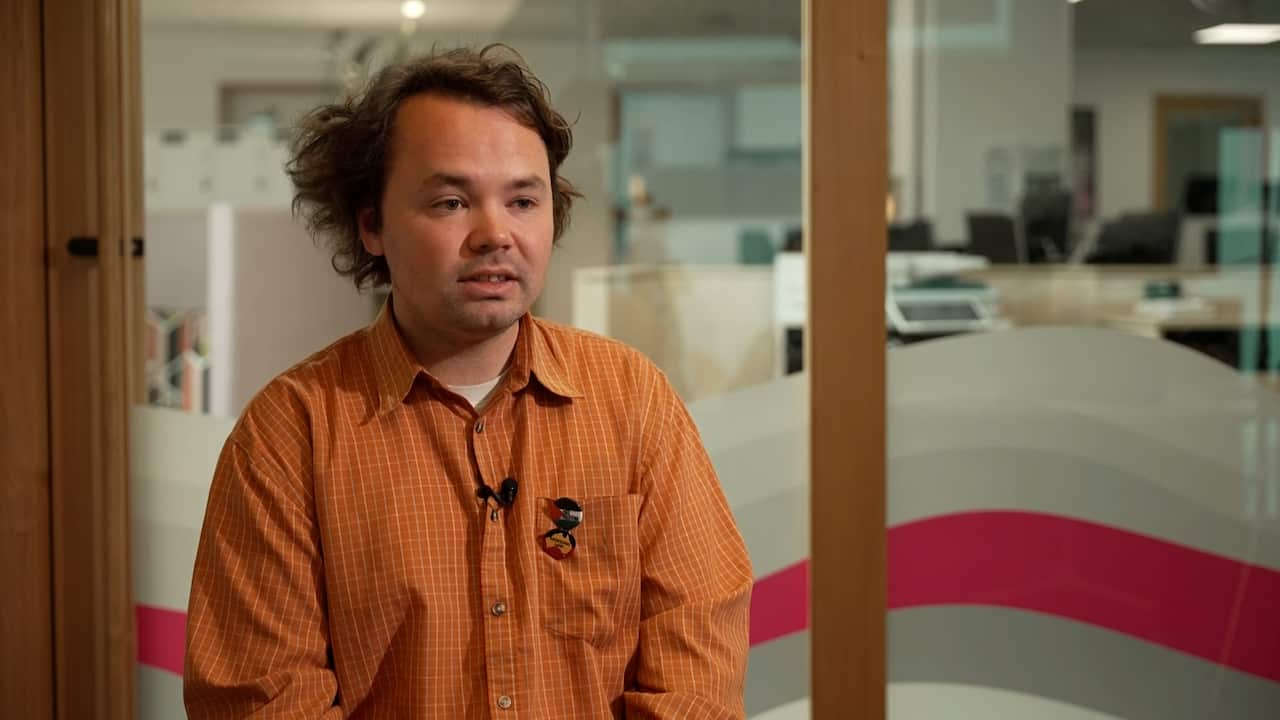
Vote organiser James McVicar told The Feed he wants his union's legacy to be one of boldness — "to stand on the right side of history ... even when it might be unpopular or controversial." Source: SBS
"University students across the country have voted to demand sanctions on Israel and an end to weapons companies on our campuses," the letter said.
"Now we are calling on you, Mr Albanese and Mr Sheehy, to respond to our call."
It also hopes the referendum will build momentum for student activists to tackle other issues.
"I think taking a stand on Palestine when that is really the central political question for so many young people today was an important step for the National Union of Students to take," McVicar said.
"But it's not the only step.
"I'm for a national student union that takes up every question of oppression, every question of injustice."

